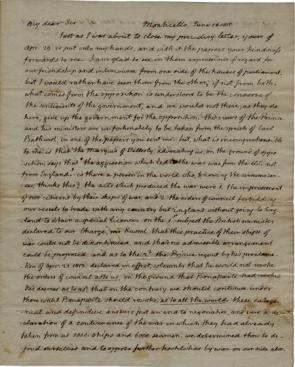Jefferson on British aggression, 1815
A Spotlight on a Primary Source by Thomas Jefferson
 In this letter in defense of American nationalism, Thomas Jefferson denounced the blustering of certain members of the British House of Lords who blamed the War of 1812 on US aggression. Jefferson’s letter followed a report from James Maury, his close friend and the American consul in Liverpool, who sent news of the remarks of the Earl Bathurst and the Marquis of Wellesley. Jefferson was so shocked by Wellesley’s comments that the United States sparked the war that he asked, "Is there a person in the world who, knowing the circumstances, thinks this?" It seems that the British parliamentarians were attempting to deflect blame for a poor performance by military and diplomatic corps. Jefferson, while summarizing British encroachments on American sovereignty, asserted that the British war effort was aimed at separating New England from the Union and riling up the American Indians against frontier settlers. He concludes the letter stating the war was ultimately favorable to America as it elevated the country’s affinity for liberal capitalism and pushed it into greater home production; Jefferson himself decided to manufacture cloth on his plantation.
In this letter in defense of American nationalism, Thomas Jefferson denounced the blustering of certain members of the British House of Lords who blamed the War of 1812 on US aggression. Jefferson’s letter followed a report from James Maury, his close friend and the American consul in Liverpool, who sent news of the remarks of the Earl Bathurst and the Marquis of Wellesley. Jefferson was so shocked by Wellesley’s comments that the United States sparked the war that he asked, "Is there a person in the world who, knowing the circumstances, thinks this?" It seems that the British parliamentarians were attempting to deflect blame for a poor performance by military and diplomatic corps. Jefferson, while summarizing British encroachments on American sovereignty, asserted that the British war effort was aimed at separating New England from the Union and riling up the American Indians against frontier settlers. He concludes the letter stating the war was ultimately favorable to America as it elevated the country’s affinity for liberal capitalism and pushed it into greater home production; Jefferson himself decided to manufacture cloth on his plantation.
A full transcript is available.
Excerpt
what is incomprehensible to me is that the Marquis of Wellesley . . . says that ‘the aggression which led to the war was from the US. not from England.’ is there a person in the world who, knowing the circumstances, thinks this? the acts which produced the war were 1. the impressment of our citizens by their ships of war, and 2. the orders of council forbidding our vessels to trade with any country but England without going to England to obtain a special licence. . . . these categorical and definitive answers put an end to negociation, and were a declaration of a continuance of the war in which they had already taken from us 1000. ships and 6000. seamen. we determined then to defend ourselves and to oppose further hostilities by war on our side also. . . . they expected to give us an exemplary scourging, to separate from us the states East of the Hudson, take for their Indian allies those West of the Ohio, placing 300,000 American citizens under the government of the savages, and to leave the residuum a powerless enemy, if not submissive subjects. I cannot conceive what is the use of your Bedlam, when such men are out of it. . . . The interruption of our intercourse with England has rendered us one essential service in planting radically and firmly coarse manufacturers among us.
